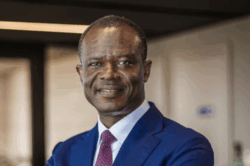By Seth KRAMPAH, back from Abuja, Nigeria
Africa is still lagging behind in global trade volumes despite its recent impressive growth rate of 12.4%. The continent’s share in global trade remains alarmingly low holding just 3.3%, notwithstanding signs of economic resilience and a strong rebound in merchandise trade, Afreximbank Trade Report has revealed.
In spite of global headwinds, Africa’s trade rebounded strongly in 2024, with trade between African countries growing by 12.4% to reach US$220.3 billion, from a contraction of 5.9% in 2023.
This, according to the report, shows the tangible benefits of AfCFTA implementation, even as the continent contends with rising inflation, sovereign debt risks, and a persistent trade finance gap.
The revelation was made during Afreximbank’s 2025 Annual Meetings in Abuja, Nigeria, where the Bank launched its flagship report, African Trade in a Shifting Global Financial Landscape, under the theme “African Trade in a Changing Global Financial Architecture.”
The report shows that Africa’s economy grew by 3.2% in 2024, outperforming the global economy which shrank by 3.3%. This recovery was driven by improved public finances and favourable commodity prices. However, Afreximbank cautioned that this growth is uneven and not translating into sufficient global trade presence.
Africa’s total merchandise trade increased by 13.9% in 2024, reaching US$1.5 trillion, recovering from a 5.4% contraction the year before, but the continent’s role in global value chains remains minimal.
According to Dr. Yemi Kale, Afreximbank’s Group Chief Economist and Managing Director of Research, Africa must move away from overreliance on commodity exports and accelerate industrialization, stressing the need to bridge the continent’s US$100billion trade finance gap and integrate better into global production networks.
He added that the continent must harmonise trade rules, mobilise domestic investment (e.g., pension and sovereign wealth funds), and leverage Africa’s G20 seat to advocate for fairer global financial governance.
The report also promotes the use of Pan-African Payment and Settlement System (PAPSS) to reduce dependence on foreign currencies and improve cross-border transactions.
Professor Benedict Oramah, Outgoing Afreximbank President, described the report as a strategic roadmap to reposition Africa amid rising geopolitical tensions, protectionism and economic uncertainty.
Afreximbank also highlighted the rising influence of the Alliance of African Multilateral Financial Institutions (AAMFI), noting it is helping rebuild a financial ecosystem suited to Africa’s development needs. The bank disbursed over US$17.5 billion in trade finance in 2024 and plans to scale this to US$40 billion by 2026.
The report urges African leaders to take bold steps towards industrialisation, financial independence, and policy coordination, if the continent is to break out of the periphery of global trade and build a fairer, more resilient economic future.










